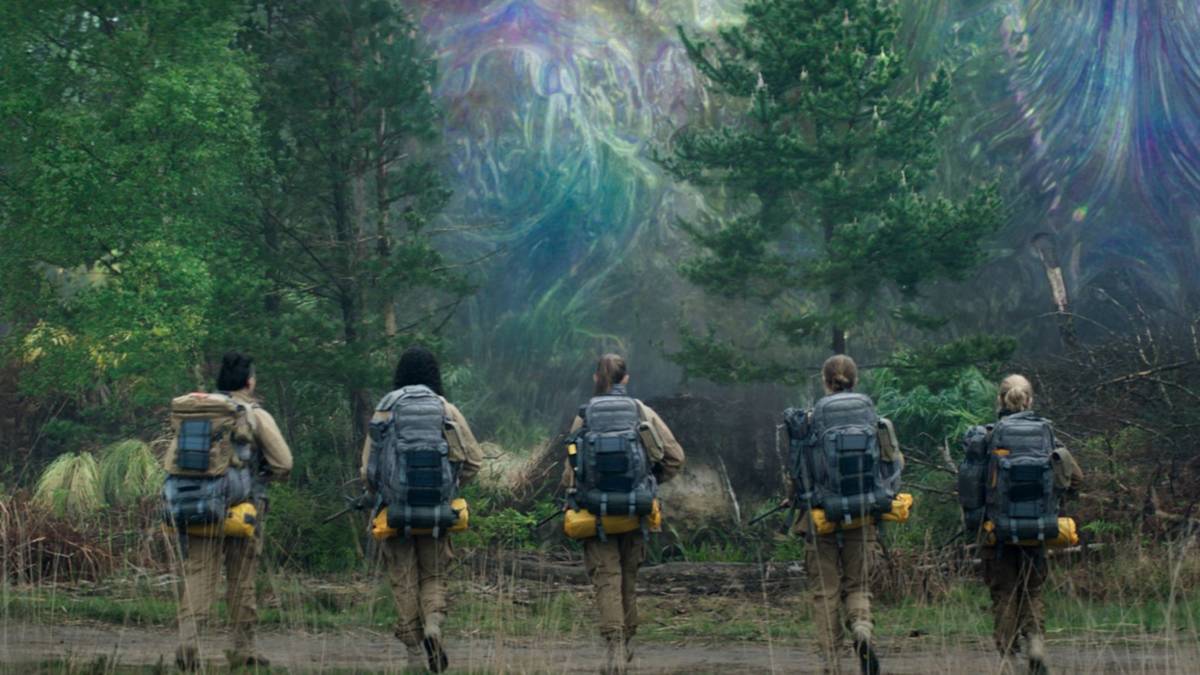Thanks to Paramount’s decision to give Alex Garland’s follow-up to Ex Machina a theatrical release in the US only, film fans in the UK had to make do with watching Annihilation on Netflix. While it’s a film that would undoubtedly be best experienced in the cinema, its visual and narrative ambitions are not lost in the translation to the small screen.
Adapting the first novel of the same name in Jeff VanderMeer’s Southern Reach trilogy, Annihilation has a certain sense of finality about it. Alex Garland has gone on record in saying that he only had access to the manuscript of the first book when he began to write the film, and thus adapted it for the screen without having a trilogy in mind. This may invoke the ire of devoted fans of the novels, as well as those who are left bewildered by unresolved plot threads, but this is very much a film that stands as its own piece from a continually promising auteur.
Annihilation’s technical construction is a sight to behold. The plot is straight forward on the surface, Lena (Natalie Portman) enters a mysterious, slowly expanding field – known as the “Shimmer” – with a team of volunteers. The world Garland presents outside of this foreboding veil is one of drab blandness. Everything is clinical, dressed in muted steel blues. Nobody talks about how they feel, they ignore their problems and continue on a path of self-destruction.

Of course, upon entering the enticing vivacity of the Shimmer, a world of colour and life serves as the backdrop for the majority of the film. Scenes set in the daylight are punctuated by a gorgeous colour palette, a collection of sharp blues, oranges and pinks for the eyes to feast on. The disarming beauty of the Shimmer initially comes off as the classic dressing up of a darker underbelly with an attractive image, a simple yet effective juxtaposition.
There is more at play at the heart of the film’s narrative, however. As the story unfolds and the horrors of what lie within the Shimmer reveal themselves, the recurring theme of mutually assured destruction guides each character’s actions. There’s a certain level of pessimism woven into the fabric of Annihilation, nobody truly enters the Shimmer with the belief they’re going to come back out. It’s a bold move to essentially inform the audience that they’re watching a mass suicide, with a finale that creates more questions than it answers, while also providing some hope in a seemingly godless world.
The bulk of the film’s humanity lands squarely on the shoulders of Portman, who proves yet again that she’s one of Hollywood’s most reliable performers. Lena is a character of constant conflict, be it with herself, her loved ones, or the team she’s walking into hell with. To play the part of someone whose key trait is the embrace of doom isn’t an easy task when they’re the protagonist. Portman must traverse the murky waters of the Shimmer (literally, at one point) with the viewer in tow, forging a connection with the viewer that lets them take everything in at the same speed.
While not a character study, Annihilation’s broad science fiction themes communicate relatable elements of the human condition through each character clearly enough that they are impactful. Depression and suicidal tendencies are prominently featured throughout, though there is more to this on a philosophical level than just characters being sad and expositing about it while sat in a dimly lit room.

Depression isn’t treated as a bogeyman, but as a natural occurrence in the human condition, our passive nature of self-destruction isn’t shied away from, but confronted head on. It takes courage to make a film like Annihilation, the discoveries each character makes about their own mortality while inside the Shimmer is a moving approach to character development.
There are, of course, some technical niggles that hold this film back after scaling it down to Netflix. It’s a crying shame that the sound design has received such a downgrade. American critics have all been quick to acknowledge the sense of unease created by the film’s soundscapes, something one can only experience in the cinema or with a pricey home speaker system. Watching Annihilation through a television screen just isn’t how it should be viewed. This meant that it fell to the visual presentation and writing to maintain interest. Thankfully, Garland is gifted enough as a storyteller that this isn’t a problem, it’s just sad that international crowds won’t get to see it in its true form.
Annihilation is a fine piece of hard sci-fi, evoking calls of Lovecraft in its horror segments (you’ll never look at bears the same way again) and is imbued with Garland’s signature understanding of human interaction. If Ex Machina was about the morality of our relationship with technology, then this is a tale of our relationship with the fragility of what it means to exist.
Some of the coverage you find on Cultured Vultures contains affiliate links, which provide us with small commissions based on purchases made from visiting our site. We cover gaming news, movie reviews, wrestling and much more.



